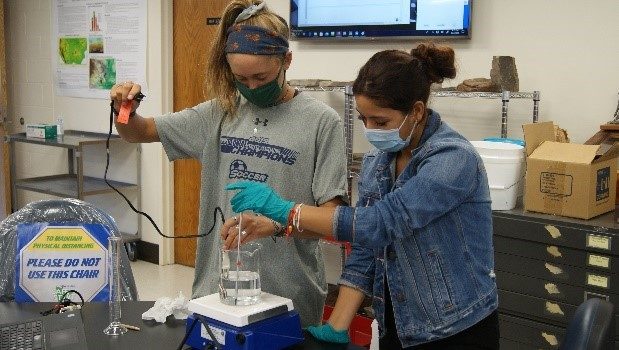
Reflections from the Summit: a field trip from home
Students get hands-on experience at 2020 Virtual Summit

By Dr. E. Christa Farmer
In a non-pandemic world, my Oceanography class would take a field trip each semester. The goal is to bring science to life using real world examples of conservation efforts – valuable experience a lecture or textbook could never provide.
Due to the Covid-19 pandemic, that trip was put on indefinite hold.
When we heard that the 2020 National Coastal & Estuarine Summit had moved to an entirely virtual platform, I knew it was the best alternative for my students to network with professionals and learn more about the environmental and social challenges facing our oceans and coasts.
In total, 18 Hofstra University students attended three dozen virtual sessions during the three-day event, each taking a unique perspective back to the classroom.
Luckily, Hofstra is situated on the heart of Long Island, just a few miles from the Long Island Sound to the north and the Western Bays of the Great South Bay to the south, an important part of the South Shore Estuary Reserve– literally surrounded by the exact habitats and restoration projects the students learned about at the Summit.
So many of the concepts addressed are central to our educational and  scientific mission. Particularly, issues of water quality and wastewater treatment are important to us. So, when we ultimately do return to a normal in-person learning schedule, we will be able to walk out our front door and put this new information to practice right here in our community.
scientific mission. Particularly, issues of water quality and wastewater treatment are important to us. So, when we ultimately do return to a normal in-person learning schedule, we will be able to walk out our front door and put this new information to practice right here in our community.
Of course, virtual learning does have its drawbacks, but the Virtual Summit opened a new door for my students.
There is no way we could afford to send 18 students plus staff to an in-person conference. Time, money, and access are huge barriers for young people, as well as indigenous communities and communities of color, in getting the most out of these types of opportunities. Hopping on the computer between classes to watch a session or join a discussion made it much easier for my students to participate.
I do hope that future Summits, and other conferences, will continue to incorporate some version of a virtual platform in order to make access and opportunity more available. So many vital networking opportunities and teaching moments are missed because of barriers to entry.

Dr. E. Christa Farmer is a professor in the Geology, Environment, and Sustainability Department at Hofstra University. You can learn more about her work here: https://sites.hofstra.edu/christa-farmer/. Her class received financial support to attend the summit thanks to a generous gift from The Island Foundation.
